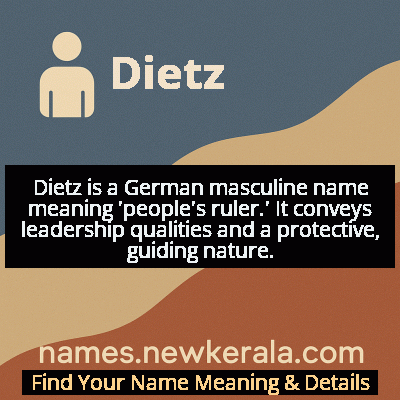Dietz Name Meaning & Details
Origin, Popularity, Numerology Analysis & Name Meaning of Dietz
Discover the origin, meaning, and cultural significance of the name DIETZ. Delve into its historical roots and explore the lasting impact it has had on communities and traditions.
Name
Dietz
Gender
Male
Origin
German
Lucky Number
1
Meaning of the Name - Dietz
Dietz is a German masculine name meaning 'people's ruler.' It conveys leadership qualities and a protective, guiding nature.
Dietz - Complete Numerology Analysis
Your Numerology Number
Based on Pythagorean Numerology System
Ruling Planet
Sun
Positive Nature
Leaders, ambitious, highly driven, self-reliant, innovative.
Negative Traits
Overly aggressive, domineering, impatient, selfish.
Lucky Colours
Red, orange, gold.
Lucky Days
Sunday.
Lucky Stones
Ruby, garnet.
Harmony Numbers
2, 3, 9.
Best Suited Professions
Entrepreneurs, managers, engineers.
What People Like About You
Courage, determination, leadership.
Famous People Named Dietz
Dietz Bering
Historian and Author
Renowned German historian specializing in name research and cultural history
Dietz Edzard
Painter
German-French painter known for his elegant portraits and interior scenes
Dietz Feicht
Architect
Influential German architect known for modernist church designs
Dietz Lange
Theologian
German Protestant theologian and university professor
Name Variations & International Equivalents
Click on blue names to explore their detailed meanings. Gray names with will be available soon.
Cultural & Historical Significance
The name gained particular prominence during the Middle Ages through figures like Dietrich von Bern, the legendary hero based on the historical Ostrogothic king Theodoric the Great. This connection to heroic literature and medieval epics cemented Dietz's association with strength, wisdom, and just rule. In modern times, while less common as a given name, it remains a widespread German surname, preserving its cultural heritage across generations and maintaining its connection to German identity and history.
Extended Personality Analysis
Individuals named Dietz are often perceived as natural leaders with a strong sense of responsibility toward others. The name's meaning of 'people's ruler' suggests someone who is authoritative yet caring, possessing the ability to guide and protect those around them. They tend to be decisive, practical, and grounded individuals who approach challenges with methodical thinking and determination.
Common traits associated with Dietz include reliability, loyalty, and a protective nature. These individuals often exhibit traditional values and a strong work ethic, combined with practical wisdom that makes them excellent problem-solvers. While they may appear reserved initially, they typically possess deep convictions and a steadfast character that inspires trust in others. Their leadership style tends to be more paternal than authoritarian, focusing on the well-being of their community or group.
Modern Usage & Popularity
In contemporary Germany, Dietz is primarily used as a surname rather than a given name, though it occasionally appears as a first name in families seeking to honor ancestral traditions. The name has seen a decline in popularity as a first name since the mid-20th century, reflecting broader trends away from traditional German names. However, it maintains cultural relevance through its continued use as a surname and occasional appearances in business names and geographical locations throughout German-speaking regions. Modern usage tends to be concentrated among older generations or in rural areas where traditional naming customs persist.
Symbolic & Spiritual Meanings
Symbolically, Dietz represents authority tempered with responsibility, embodying the ideal of servant leadership where power is exercised for the benefit of the community. The name carries connotations of protection, guidance, and stability, suggesting someone who provides shelter and direction like an ancient oak tree in a forest. Metaphorically, it evokes images of medieval guardians and wise counselors who balance strength with compassion.
The name also symbolizes cultural continuity and heritage, serving as a bridge between modern German identity and historical traditions. It represents the enduring values of duty, honor, and community that have characterized German society across centuries, making it more than just a name but a vessel carrying cultural memory and collective identity.

